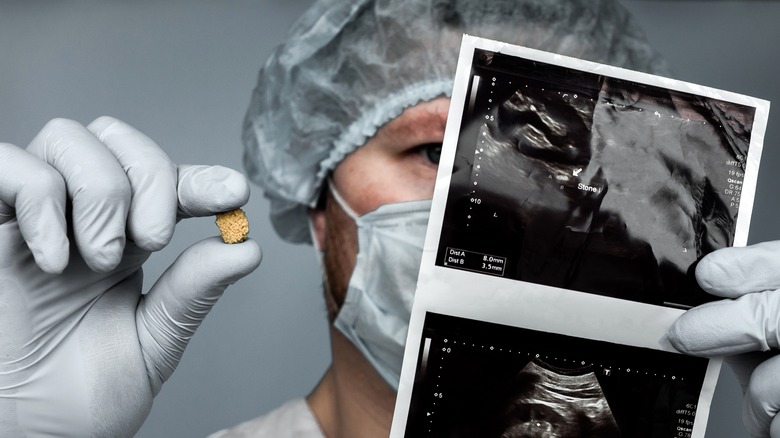If You Eat Too Much Peanut Butter, This Is What Could Happen To Your Kidneys
Not that we need any more reasons to love peanut butter; it's nutty, creamy, and just the right combo of salty and sweet all in one delicious spoonful. Nonetheless, here are a few more pros to add to the list: peanut butter may help us boost our energy levels, maintain a healthy weight, and reduce our susceptibility to heart disease (via Prevention).
While peanut butter offers us no shortage of vitamins and minerals, the more doesn't necessarily mean the merrier. In a 2-tablespoon serving of peanut butter, you'll find 65 milligrams of oxalate, reports Healthline. Naturally found in nuts, oxalate has earned the nickname "anti-nutrient," as it can interfere with the body's nutrient absorption process, according to Medical News Today. Overconsumption of oxalate may also make a person more prone to developing kidney stones, as an abundance of oxalate in a person's urine can crystallize into hardened deposits (via Mayo Clinic).
Overconsumption of peanut butter may increase the risk of kidney stones or kidney damage
Calcium oxalate kidney stones are the most common type of kidney stone. While oxalate is produced by the liver, it can also be obtained through certain foods, such as peanut butter. The risk of kidney stones may be higher for peanut butter lovers who also have low fluid intake, as dehydration is a main contributor to the development of kidney stones. While anyone can be affected, kidney stones are more often seen in men than women. People with obesity, recurrent urinary tract infections, and those with a family medical history of kidney stones may also be at increased risk.
While rare, eating high-oxalate foods like peanut butter in excess may also make a person more susceptible to kidney damage, according to a 2014 case report published in Kidney Research and Clinical Practice. A man in his mid-40s was diagnosed with peanut-induced oxalate nephropathy that resulted in acute kidney failure after arriving at the hospital with chronic diarrhea and vomiting. While the man did have various other health conditions, his kidneys had been in good health up until two months prior. In addition to taking a variety of medications and drinking an excess of alcohol, the patient had eaten only peanuts during the five days before he was hospitalized — specifically, upwards of 130 grams of peanuts daily. The researchers determined that overconsumption of peanuts and alcohol could potentially contribute to kidney failure.
What is a low-oxalate diet?
While many factors influence our kidney health, people with kidney stones may benefit from a low-oxalate diet in order to help pass the stones or prevent them from developing in the first place (via Southern Kidney Care). This means avoiding foods that are rich in oxalate, like nuts, chocolate, hazelnut spread, and yes, peanut butter. However, registered dietitian and kidney stone prevention researcher Melanie Betz writes via The Kidney Dietitian that a low-oxalate diet may not always be necessary or even helpful. Because there are different types of kidney stones, maintaining a low-oxalate diet won't make any difference if a person has uric acid kidney stones (rather than calcium oxalate kidney stones).
For people who do have greater concentrations of oxalate in their urine, however, reducing consumption of high-oxalate foods may be advised. That being said, this doesn't mean you should also lower your calcium intake to reduce your risk of calcium oxalate kidney stones. On the contrary, maintaining a healthy intake of calcium through dietary sources can help protect against kidney stones (via Mayo Clinic). Of course, every case is different, so be sure to talk with your doctor if you develop symptoms of kidney stones. This includes sharp, intermittent pain in your sides or back, nausea, vomiting, or burning sensations when peeing. Treatment options may vary, as may patient dietary recommendations.



